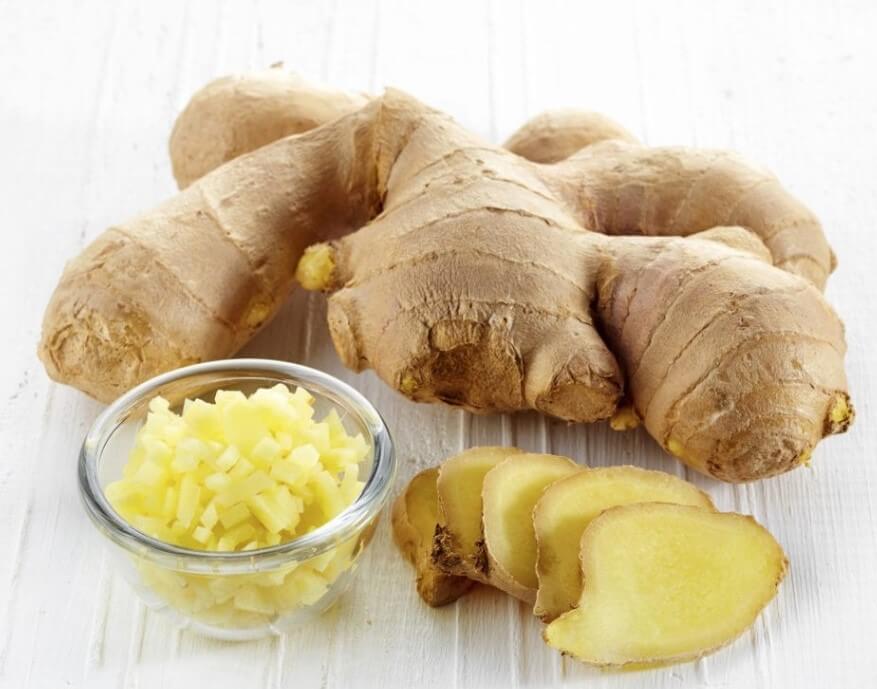Ginger is native to Indomalaya and people have cultivated it since ancient times to strengthen the body’s defenses. Let’s discover the properties, benefits and contraindications of ginger.
7 contraindications of ginger

If you consume ginger regularly, you surely know its properties and benefits but … Have you ever wondered what the contraindications of ginger might be ?
Ginger, like other roots, is a beneficial plant for the organism, that is why in traditional Chinese medicine it has been used for more than 2000 years for treating colic, diarrhea, nausea, migraine and even arthritis. In addition, it can be consumed dry, fresh, in tea or simply take advantage of its extract.

Properties and benefits of ginger
Ginger contains a wide variety of nutrients, essential oils and antioxidants that benefit health. In fact, it has been classified as a “superfood” due to its interesting properties.
One of its active compounds, gingerol, is responsible for giving much of its beneficial effects on the body. To go into detail, here are its properties:
- Contains expectorant, antibacterial and antioxidant properties.
- Its thermogenic properties improve metabolism, thus accelerating digestion and reducing inflammation in the intestines.
- It reduces nausea because it is a natural antiemetic.
- Regulates blood circulation due to its high content of magnesium and zinc.
- Reduces stress levels, as it contains cineole which produces a relaxing effect.
- It improves the absorption of nutrients since it increases the stimulation in the stomach and the function of the enzymes.
- It fights migraines because it blocks the production of protasgladin , a substance that inflames blood vessels.
However, sometimes its consumption can be counterproductive , generating some side effects. If an inappropriate intake of ginger is made, some diseases can even be exacerbated. Therefore it is recommended not to consume it in case of:
- Gastritis .
- Gastric ulcers
- Irritable colon.
- Colitis.
The reason? This rhizome inflames the mucosa causing abdominal pain and colic. Pay attention to the following points, if for any reason you have any, it is better to abstain from consuming ginger.
See also: Ginger allergy: how to recognize it?
Ginger contraindications
1. When taking anticoagulants
Anticoagulants are usually indicated to prevent thrombi that form in the blood, for example: aspirin, ibuprofen, or naproxen.
If you ingest any of these anticoagulants on medical recommendation, it is not recommended to consume ginger because the plant has the same effects as these medications, that is, it also slows the blood clotting process.
If you combined ginger with these medications, you would increase the chance of bruising or bleeding.

2. During pregnancy
There are conflicting opinions regarding the intake of ginger during pregnancy. Some studies argue that ginger may cause hormonal changes and lead to premature contractions.
This without taking into account the aforementioned anticoagulant effects that would increase the possibility of bleeding.
On the other hand, other studies maintain that ginger would help alleviate the annoying morning sickness that many pregnant women suffer during the first months of gestation.
Therefore, it is essential to seek the opinion of a specialist before starting to ingest it regularly in order to avoid the contraindications of ginger.
3. Hypertension problems
Taking ginger could block calcium channels, which would undoubtedly damage blood pressure. When calcium enters the blood vessels, it increases the speed with which the blood travels and, therefore, the blood pressure rises. For this reason, it is not a good idea to consume ginger if you are under treatment for hypertension.
4. Diabetes
Actually, ginger is not the problem, since it has a low glycemic index so it does not alter the level of sugar in the blood. However, if the patient is undergoing treatments such as insulin injections, it should be avoided.
In this case, it is advisable to consult a specialist to moderate the amount of medications and thus be able to enjoy the benefits of ginger.
5. Low weight
Without a doubt, one of the most recognized benefits of ginger is its slimming effect. It works as an appetite suppressant , speeding up the digestive process and eliminating excess fat. Therefore it is not good to consume it if you are underweight or want to increase muscle mass.
6. Hemophilia
People with hemophilia tend to bleed for long periods since they do not have a clotting factor that controls that bleeding. By stimulating blood circulation, ginger may cause shock in hemophilia patients. So, for no reason, its consumption is indicated.
7. Heart problems
Ginger helps unblock blood vessels , provided the dose consumed is as recommended.
However, consuming ginger excessively could cause reverse effects. It is suggested to take it for periods no longer than 4 days and rest for a week. Of course, it is advisable to consult with the doctor before starting the usual intake.
Of interest: garlic benefits for women
Recommendations for consuming ginger
To avoid falling into the contraindications of ginger, it is essential that you use it in small portions to flavor the dishes or as another ingredient in salads.
It is best to buy it fresh because it contains more quantity of gingerols. When buying it in powder it is important that you verify that it is of organic origin to avoid containing pesticides.
On the other hand, it can be stored unpeeled for up to 6 months , as long as it is kept refrigerated, preferably in glass containers and away from sunlight.
Are the contraindications of ginger clear to you?
